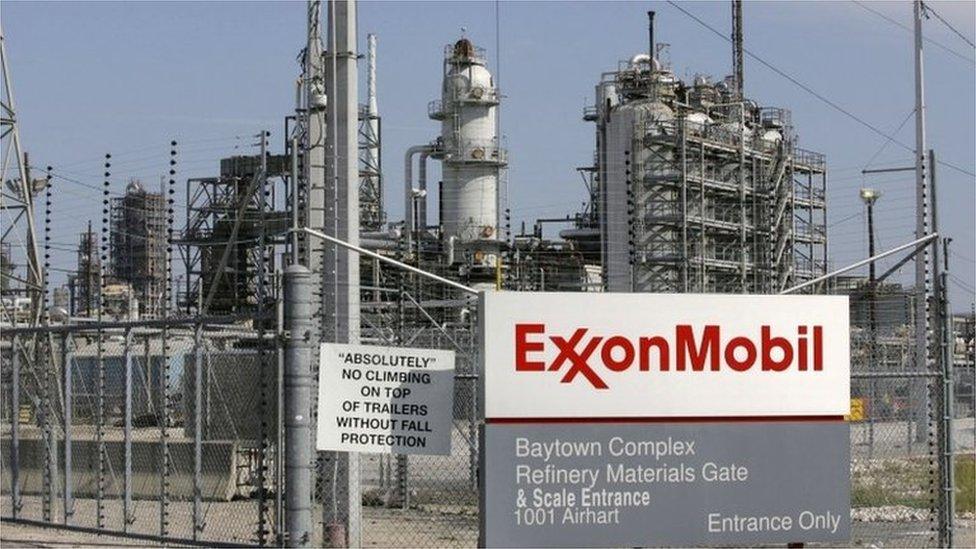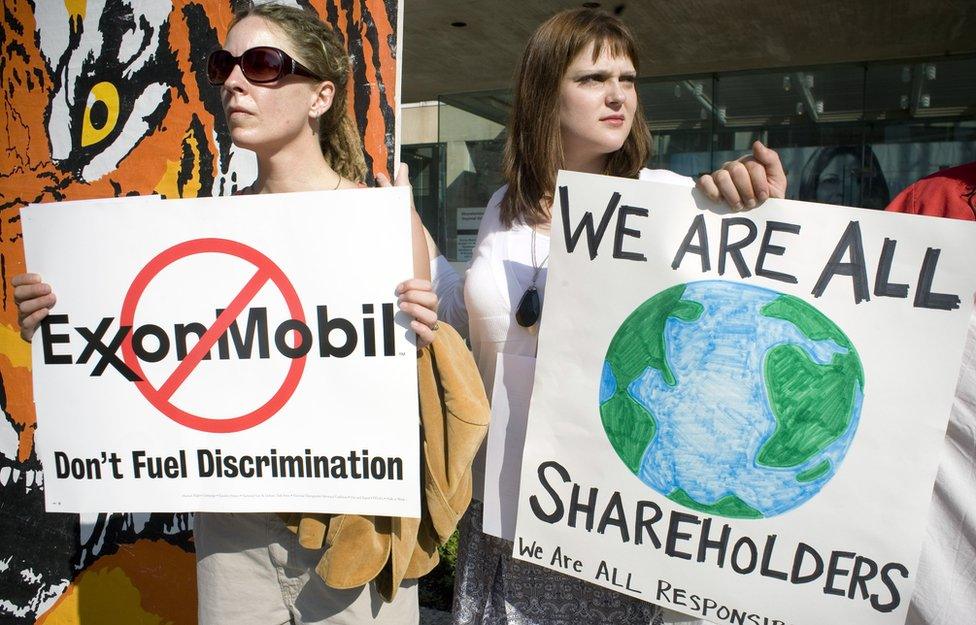Exxon shareholders take 'small step forward' on climate
- Published

Exxon Mobil shareholders have rejected most proposals to increase reporting on climate change.
But they accepted a resolution that could see a climate activist elected to the board in the future.
Despite opposition from the board, just over 60% of investors backed the motion that would allow small shareholders to nominate anyone to join the board.
Exxon said it would re-evaluate its policies. It was the first shareholder decision accepted by Exxon in 10 years.
Strong 'yes' vote
Called the proxy access measure, it was the only one of 11 resolutions related to climate change to pass at the Exxon annual general meeting in Dallas, Texas.
It allows anyone who has 3% of the company's shares to propose a candidate for the board. At present only the existing board can nominate new members for shareholders to vote on.
"It's an extremely strong vote, a very strong majority vote in an area where Exxon has been an outlier," said Edward Mason from the Church Commissioners, which represents the Church of England's investments.
"It could well have implications for climate change if implemented."
Last year the proposal fell just short of a majority, but in the interim, similar proposals had been accepted by over 80 big companies.
Speaking after the meeting, Exxon CEO Rex Tillerson said that the board would have to reflect on the result of all the shareholder resolutions.
"Each shareholder resolution is assigned to the relevant committees of the board and they will review the results and begin the discussion around what if any further action we should take around those votes, including the trends," he said.
Unprecedented event
This AGM was like few others in the company's history.
As oil prices have fallen, so have Exxon's profits, down to $16.1bn (£11bn), the lowest since 2002.
The company was also downgraded by investment rating agency S&P, losing the status it has held since the great depression of the 1930s.
The meeting took place as Exxon Mobil continues to face legal investigations over the extent of its knowledge on climate science and whether it played down global warming for financial benefit.
The gathering was also the first to take place after 195 countries agreed on a new global plan to fight climate change in Paris last December.

Protestors have been making their feelings known outside the Exxon AGM for many years
Countries agreed that the increase in global warming should be kept "well below" 2C.
Supporters managed over 38% of the shareholders vote on this question. Proponents said it was the strongest showing ever for a climate resolution.
"It shows which way the momentum is going," Mr Mason added.
The board of Exxon Mobil had opposed the changes, saying it was confident it had adequately addressed climate risks.
In the past year, Shell, BP and Statoil bowed to investor pressure and agreed to examine the issue. But Exxon's shareholders were unwilling to join them.

Key Facts
Exxon can trace its origins back to 1870 when John D Rockefeller created the Standard Oil Company .
Exxon and Mobil merged in 1999 in a deal valued around $80bn. The combined value of the company in 2015 was $353bn, making it the world's most valuable, publicly traded oil company.
The company employs around 75,000 around the world.
The oil spill from the Exxon Valdez tanker in Alaska in 1989 was the biggest in US history until Deepwater Horizon in 2010.
In 2016, the Rockefeller foundation said it would eliminate its holdings in Exxon, saying the company had misled the public over climate change.

CEO Tillerson made an impassioned defence of the use of fossil fuels well into the future.
"The reality is there is no alternative energy source known on the planet or available to us today to replace the pervasiveness of fossil fuels in our global economy, in our very quality of life, in our very survival," he said during questioning by shareholders.
"It is a balance event between future climatic events that could be catastrophic but are unknown and the more immediate needs of humanity."
This approach didn't impress many activists who had campaigned for change.
One of the people who asked a question at the AGM was Anna Kalinsky, the granddaughter of the late Exxon scientist, Dr James Black. In the 1970s, he said that the burning of fossil fuel was increasing carbon dioxide levels and was a likely cause of global warming.
"Exxon is continuing to have an effect on the environment, Exxon is continuing to fund climate denial and Exxon needs to turn that around," she said.